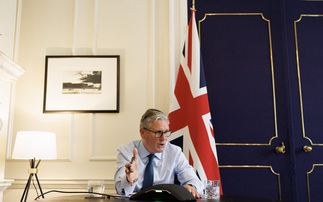A Republican-controlled Congress spells bad news for the green economy and UN climate change talks, but will it prove as disastrous as some environmentalists fear
4. Wind and solar tax credits braced for fresh political row
Another likely impact of the Midterms is a revival of the row over wind and solar tax breaks. There is a case for trimming these incentives as wind and solar energy costs continue to fall, but the industry will balk at any move to axe them altogether. Another round of investment-killing arguments on Capitol Hill over the future of renewables policy cannot be ruled out, particularly given the intensity of Republican opposition to clean energy subsidies.
5. Obama is holding the line, for now
Ahead of the vote earlier this week, White House press secretary Josh Earnest stressed that the Obama administration's climate change strategy would not be sacrificed to appease a Republican-controlled Congress. "There are too many Republicans in Congress who even deny the basic scientific fact that climate change is occurring and something that policymakers should be concerned about," he told reporters. "So the president will use his executive action to take some additional steps."
As such the White House is likely to continue to push the EPA to enact emissions rules, while Earnest also revealed that Obama intended to use his final two years in office to "continue to talk about this issue in a way that lays the groundwork for action by future presidents and future Congresses".
The key question now is how high a priority Obama wishes to make climate change if (and it is more likely when) the Republicans engineer a stand-off over his environmental strategy. With his popularity ratings already plumbing the depths, Obama will not want to be blamed for high energy prices or another disruptive Beltway row. But equally, he may well be emboldened by polling showing his climate policies are broadly popular. A President who managed to cut emissions while growing the economy and tackling the deficit must be due some credit at some point.
6. US credibility at international climate talks is under threat
Obama has quietly engineered a significant boost to the US reputation at the UN climate change talks, albeit from a very low base. Constructive bi-lateral talks with China coupled with tangible steps by the EPA to curb emissions have strengthened the US negotiating position and fuelled hopes that an international agreement could yet be brokered next year.
However, there is little doubt that a more vocally hostile Congress could undo much of this good work. As Carbon Brief noted this week, Obama is likely to come to Paris and pursue an international deal, but everyone from the smallest nations to the largest emerging economies will be sceptical that the US government will be able and willing to honour any agreement when the Republican chorus line in Congress is noisily denouncing any treaty and threatening not to ratify it. The standing of the US among international climate diplomats is also unlikely to be helped by likely Republican moves to defund UN climate initiatives.
Hopes remain that an international agreement can be reached, but the chances of an ambitious deal look less compelling than they did at the start of the week.
7. The US public wants climate action, even if it is not a priority
The many potential negative implications for the green economy that result from the Midterm results have to be set against the fact that growing numbers of Americans back climate action. A poll published earlier this week showed that 49 per cent of people likely to vote in the Midterms wanted tougher climate regulations, compared to just 35 per cent who were opposed to such moves. In addition, 53 per cent said that it was either somewhat or very important that Congress pass climate legislation within a year. And more voters thought the environment gets less attention than it deserves compared to those who think the opposite.
So why did the public return a Congress that is even more hostile to climate action than the one it replaces? The answer may lie in the fact that while more and more Americans want to see measures to tackle climate change and most now accept the climate is changing, relatively few regard it as a top priority. A separate Pew poll from September ranked the environment eight out of 11 issues. Although it also found it is much more likely to be regarded as important by Democrats than Republicans, suggesting that whoever is seeking to animate the Democrat base come 2016 will have to prioritise environmental action.











